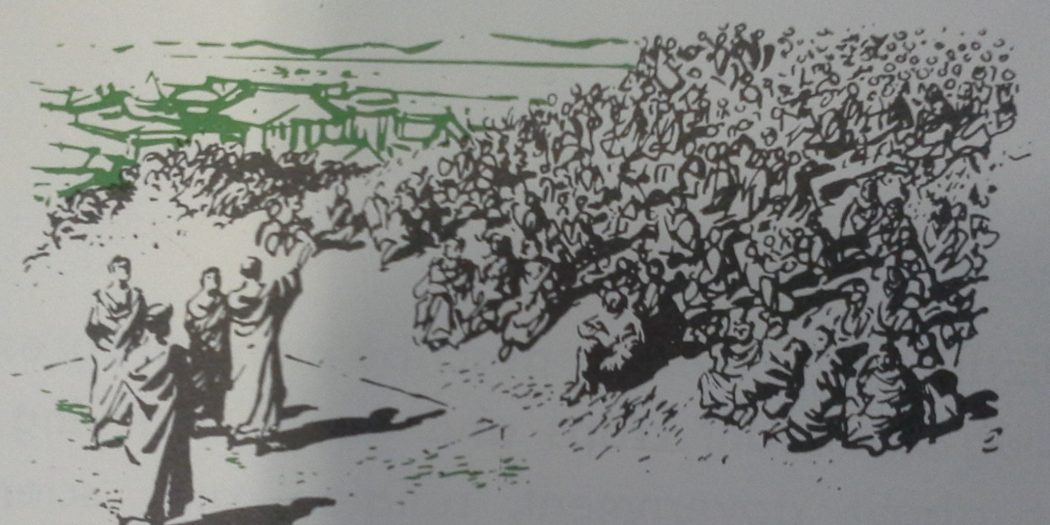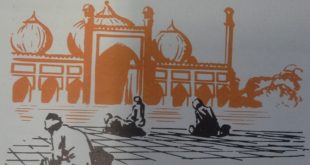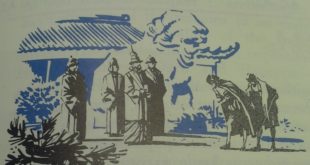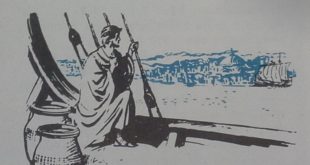If you had been a citizen of the ancient Greek city of Athens on a fine spring morning in 409 B.C., you would have gathered with thousands of your fellow citizens on a hillside inside the city. You would then have listened carefully to the discussion of various matters of business, conducted by the chairman and secretary of the meeting from a platform below and facing you. You would have seen an Athenian citizen thread his way from the hillside to this platform. This was a sure sign that he had a proposal to make to the voters.
The citizen turned toward the assembled throng and spoke in a strong, clear voice. A man named Thrasybulus, he said, should be rewarded with a golden crown for his services to Athens. When the speaker paused, another citizen came to the platform. Yes, by all means thank Thrasybulus and give him a golden crown, urged the second speaker. He went on, these acts were not enough, because Thrasybulus was a foreigner, the best reward for serving Athens so faithfully and so well would be to make him an Athenian citizen. Would the voters of Athens do this? he asked. The chairman called for a vote by a show of hands and tellers counted the votes. A majority was in favour of the proposal and it was declared officially to have been approved by the voters of Athens. The secretary had a copy of the proposal carved on a marble slab to make the record permanent and there the record is to this day, over 2800 years later, but still readable!

This old record tells us that Athenian citizens held meetings, discussed their own problems, and decided for themselves What they would do. The voters, instead of a pharaoh or a king, made the plans and the rules of government. Here was something new in the ancient world — people governing themselves. We call such government democracy, from the Greek words demos and kratos, meaning “people” and “rule.”
Read about the achievements of the ancient Greeks. They not only developed free government; they believed just as strongly in other kinds of freedom, including freedom to think. As a result, the Greeks introduced new ideas in science, in literature, in architecture and in art. Along with them there developed still another idea: that people themselves are important — for what they are and what they do. In many respects these ancient Greeks thought and acted much as people in democracies do today.

In seeking to understand ancient Greece we try to answer these five major questions:
1. How did Greece become important?
2. How did Athens assume the leadership of Greece?
3. What were the important characteristics of Greek life?
4. How did Greek Civilization spread?
5. What were the outstanding achievements of the Greeks?
1. How did Greece become Important?
We have learned how new Greek tribes invaded the peninsula in southern Europe occupied by the Achaeans. These peoples spoke a language belonging to the same family — the Indo-European — as did the Achaeans, the Hittites, the Medes, and the Persians. Although these later Greeks largely wiped out the civilization of the Achaean Age, they absorbed many customs and in turn built up an advanced civilization of their own.

The Greeks developed a large number of small city-states. By 500 B.C. the Greek people were living in some 300 separate and independent city-states. Most of these tiny nations were located in the Creek peninsula itself, or on the Aegean islands and along the northern and eastern shores of the Aegean Sea. Some, however, were to be found on the straits leading to the Black Sea and on the shores bordering that sea. Still other settlements dotted the southern and south western coasts of Italy and fringed the island of Sicily. Some were even strung out along the Mediterranean coast of what is now France. There were also prosperous Greek cities in North Africa to the west of Egypt.
Geography divided the Greeks. How did the Greeks come to develop the idea of city-states? Surely it was not by imitating the city states of the far older Sumerians, for the Greeks had never heard of the Sumerians. You will find one answer to this question in the geography of Greece itself. Greece is a rugged country, crisscrossed by mountain ranges, its ragged coast line indented by bays and gulfs. These natural barriers split Greece into many small areas, each separated from the others by mountains or arms of the sea. The groups of people in these walled-off sections learned to solve their own problems in their own way. Each city and town, whether large or small, was free and independent, proud of its own laws and constitution. The Greek word for city state was polis. From this word come such terms as “politics,” “policy,” and “police,” all of which have to do with matters of state and public interest.
The Greeks carried the notion of city-states wherever they went. The Greeks carried their love of freedom and independence and their form of government beyond the Greek peninsula. Energetic freedom-loving people left their old homes in Greece for many reasons. Some wanted more land or an opportunity to make a better living. Some were not satisfied with their government at home. So they moved to the islands and distant shores of the Mediterranean and Black Seas. (Many hundreds of years later, for much the same reasons, people came from Europe to America in search of a better and freer way of life.) Although such newly settled colonies kept up many ties with the homeland, they were founded as city-states, independent of each other and of the “mother cities” in Greece.
The Greeks thought of themselves as a single group of people. Even though these Greek city-states were independent and often disagreed among themselves, they realized they had much in common. They spoke the same language, they worshiped the same gods, they had similar ideas about government, they had the same family customs. They explained these likenesses by saying that they were all descended from a common ancestor named Hellen. This notion, of course, was not true. It explains why the Greeks called themselves Hellenes and their country Hellas. All peoples who were not Hellenes were called barbarians, meaning simply “outsiders.” This feeling of oneness among the Greeks was a reason why they did not co-operate well with non-Greeks.

Sparta became the chief military power in Greece. Of the many Greek city-states two, Athens and Sparta, became the most famous and powerful. Today the word Spartan implies great courage, endurance and devotion to duty. The reason is that the citizens of the city-state of Sparta were the best trained and most courageous soldiers in all Greece. There were not very many Spartans, never more than 5000 men of military age, but they had conquered many of their neighbours and seized their lands. The Spartans forced the conquered people to work for them. Among these were about 150,000 helots — laborers who were slaves of the Spartan state. They tilled the farms and performed all other kinds of physical labour. The Spartans were free, therefore, to devote their whole attention to physical training, to preparation for war and to public affairs.
Spartans followed rigid rules. Most of a Spartan’s life was regulated by the state. Newborn infants that were deformed or seemed sickly were allowed to die. When a boy was seven, he was taken from his mother and educated with boys of his age. He was taught to endure pain, hunger, cold, discomfort and to become skilled in physical sports. At eighteen he was enrolled in a military company. He lived with his fellows in barracks, and was given a state farm on which helots did the work. At thirty, the Spartan became a voting citizen. He could live in his own house now, but must report with his company for military training until he reached the age of sixty. Girls also received physical education in Sparta and competed in athletic sports.
As a result of this rigid training, the Spartans formed an army of disciplined soldiers far superior to those of the other Greek states. Such military power enabled Sparta to exert a strong influence through out the Greek world. At the same time, Sparta was able to prevent its thousands of slave labourers and other subjects from shaking off its rule.

In many respects Sparta was backward. Spartan education produced fine bodies and excellent soldiers, but neglected practically everything else. The Spartans believed in living simply and scorned all luxuries which they felt might make them soft. To guard against the temptations of wealth, citizens were forbidden to engage in trade. Sparta therefore remained an agricultural country, living by the labours of conquered peoples. Moreover, the great emphasis on military skill did not encourage Spartans to develop literature or any of the other arts.
In short, the Spartan aim was to keep everything just as it was. There was little interest in improving business, government, or the arts. Sparta was first and foremost a military state organized to benefit a small portion of the population. This upper crust of military men controlled everybody and everything.
Athens offered a striking contrast to Sparta. Athens, the other leading city state in Greece, differed greatly from Sparta. Athens too had grown by absorbing many smaller communities, but had made their inhabitants free Athenians rather than subjects. In fact, Athens built up the largest citizen population of all the Greek states. There were many slaves in Athens, to be sure, just as there were slaves in every other ancient nation; and there were some free foreigners who were not citizens. Nevertheless the proportion of the entire population who were citizens was high for those days. Unlike standpat Sparta, Athens was forward-looking. Its citizens welcomed new ideas and made great progress in industry, trade and government.
Athens became more democratic. In its early days Athens had been governed by kings, but rule by kings had given way to rule by a council and officers chosen from a class of nobles. Yet the lot of the common people was far from happy. Many had fallen into debt and lost their land. They had no share in the government nor rights in the courts.
In 594 B.C. an important step was taken. A noble who had been elected head of the state, Solon by name, put through a set of reforms. Athenian laws were changed. Debtors could not be made slaves and the nobles lost control of the courts. A new constitution was also adopted giving the common people a share in public affairs. In 509 B.C. another reformer, Cleisthenes, led Athens toward still greater democracy. He granted citizenship to many aliens or free foreigners. Henceforth no Athenian could claim special privilege because of his noble birth.

Athens and the other Greek city-states were attacked by the Persians. Not long after 500 B.C. certain Greek cities in Asia Minor revolted against Persian rule. They received some help from Athens and elsewhere in Greece. This was the excuse that Darius, the King of Persia, wanted. He put down the revolt in Asia Minor and then turned his royal wrath and the vast resources of his great empire against Athens. An army, escorted by a fleet, was sent to march around the Aegean Sea into Greece. This First Persian invasion of Greece took place in 492 B.C. A storm destroyed the Persian fleet and so forced the army to withdraw, but Darius was far from giving up.
The Athenians defeated the Persians at Marathon. In 490 B.C. the Persians came again, island hopping across the Aegean and they landed, at Marathon. There they were met by a much smaller Athenian army. The Persians, however, were without their best troops, their mounted archers. In the battle which followed, the Persians were badly beaten. The Greek foot soldiers were armed with spears and swords and protected by iron helmets, iron breast plates, iron leg guards and leather shields. The Persian foot-archers and spearmen lacked metal armour.
The desperate Persian commanders herded their shaken troops aboard ship and sailed for Athens itself. But the Victorious Athenian citizen soldiers marched quickly to the defense of the city. The Persians gave up the attack and sailed with their whole force for Asia Minor.
The victory at Marathon gave the Athenians great confidence and the courage to face further Persian attacks. The memory of Marathon is kept fresh by the “Marathon” race of about 25 miles — the distance from Marathon to Athens which is a regular feature of the modern Olympic Games. Also every year runners compete in a marathon race held outside Boston, Massachusetts. The first marathon runner was an Athenian who raced from the battlefield to Athens bearing news of the victory.
The Persian king prepared to throw all his might against Greece. The victory at Marathon did not end the Persian Wars. Xerxes, another king of Persia, took personal charge of plans for the next invasion. He would lead the greatest force ever assembled! He would put an end, once and for all, to these trouble makers in their rocky little land across the Aegean Sea!
Xerxes decided on the land route around the northern Aegean coast. Besides a large army made up of his best troops, Xerxes gathered a big fleet of ships contributed by his subjects in several countries of the eastern Mediterranean. Following royal orders, sweating slaves dug a canal across a narrow neck of rocky land in northern Greece. There, at Mt. Athos, storms had wrecked the earlier Persian fleet. The canal would prevent the fleet from being wrecked this time.
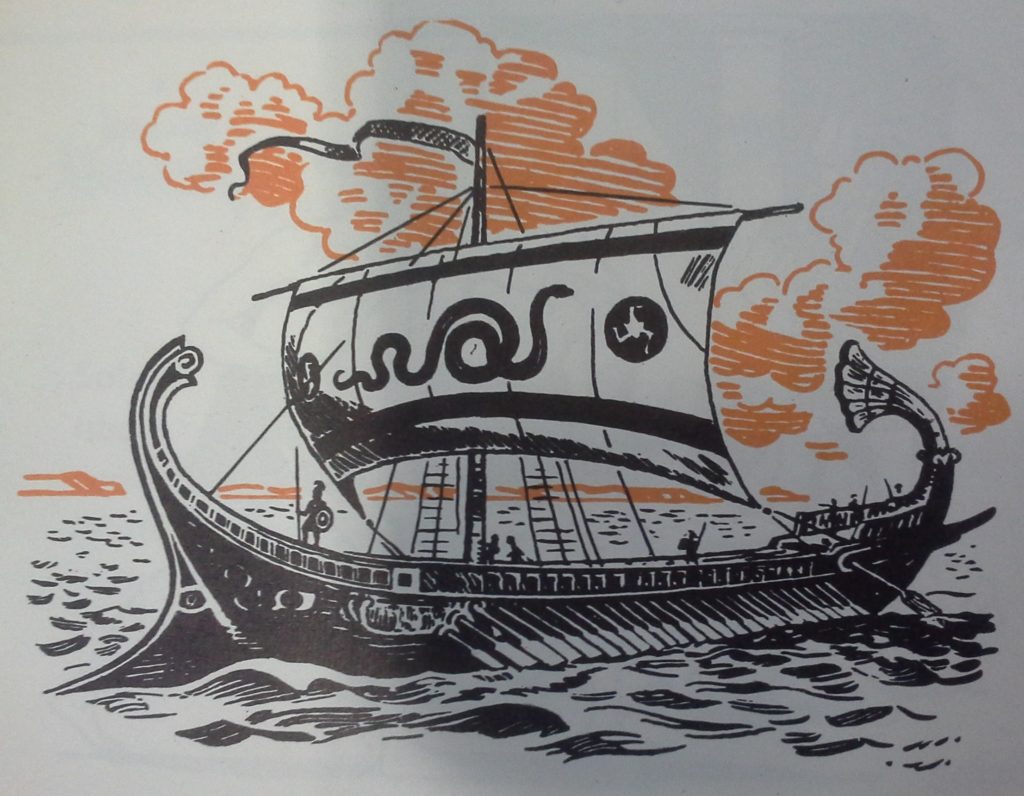
Athens led in resisting the Persians. Greatly alarmed by these warlike preparations, some city-states in Greece sent word to the Persian king that they would yield. Others decided to stay neutral, at least until they saw which side was likely to win. Athens, with Sparta and its allies and a few other Greek city states, organized to resist the Persian threat.
By 480 B.C. when Xerxes launched his attack, the Athenians had built a fleet of 200 warships manned by free citizens of Athens. These vessels were known as triremes, because they had three rows of oars on each side. Just below the water line at the bow of each warship was a heavy metal covered ram. You can imagine what would happen if a heavy Athenian vessel smashed at full speed into the side of an enemy ship. The Greeks’ plan was not only to have the powerful Athenian fleet destroy the Persian navy, but to have Greek troops, led by 300 Spartans, resist the Persian army at the narrow pass of Thermopylae. The Greeks reasoned that by destroying Persian sea power they could compel the Persian forces to withdraw. Their plan worked, but not exactly as the Greeks had expected.
The Persians were badly beaten. The Persian army crossed the Hellespont, the narrow strait now called the Dardanelles and advanced to Thermopylae. The Greeks attacked the Persian fleet that was carrying additional troops to northern Greece, but without success. In spite of the efforts of the Greeks, the Persian army slipped behind the small Greek force at Thermopylae. Most of the Greek army fled, but the 300 Spartans valiantly held their ground and died to the last man. Their courage set an example for the rest of the Greeks in all future wars.

The leader of the Athenians, Themistocles, arranged with the Athenians to abandon their city, which could not be defended successfully. The Persians occupied and burned Athens, but then they blundered. They allowed their fleet to be drawn into the narrow bay of Salamis near Athens and trapped by the Greek ships. Here superior numbers and greater speed were of very little advantage. Many of the Persian vessels were rammed and sunk, while others were captured by the Greeks. The naval battle at Salamis was a complete victory for the Greeks. Xerxes returned to Asia Minor with part of his army and what was left of his fleet. In the next year (479 B.C.), the Persian forces that had remained in Greece were crushed in a battle at Plataea.
Greece, then, had been saved! Free men, fighting for their liberty and their homeland, had beaten the greatest empire that had yet arisen. The turning back of the Persian forces made possible the remarkable development of Greek civilization during the next 200 years.
In 431 B.C. a public funeral was held in Athens for soldiers who had been killed in a war with Sparta. In a famous speech, the leader Pericles Explained the democratic ideals of Athens for which the soldiers had given their lives.
2. How Did Athens Assume the Leadership of Greece?

Our form of government is called a democracy because it is placed in the hands, not of the few, but of the many. All, moreover, have equal rights under the laws that have to do with disputes between individuals. But in public esteem, each is honoured in proportion to his renown in his particular field, his ability being fully as important as his social standing. No poor man, in short, is barred from public service when he can really do the city any good.
After the Persian Wars, Athens became the leading city in Greece. The Victory at Salamis did more than turn back the Persian invaders; it caused Athens to become the leader among the Greek city-states. After all, the Athenian navy had been principally responsible for that triumph. So the Greek cities of Asia Minor asked the Athenians to form a naval league with Athens at its head. This league, they thought, would protect all Greeks from further Persian attack. Soon nearly all of the islands and coastal cities of the Aegean Sea joined this league. As its head, Athens became the greatest sea power in the eastern Mediterranean.
Thanks to its naval strength, Athens also grew to be the leading center of commerce and industry in the Greek world. The products of the whole Mediterranean and Black Sea areas were brought to its docks. As its industries grew, Greeks from other cities flocked to Athens to take advantage of its business opportunities.
The naval league was transformed into an Athenian empire. When all danger from Persia seemed over, many of the Athenian allies wished to withdraw from the league. They feared the growing power of Athens, but the Athenians did not want to lose the power and profits that came to them through the league, so were reluctant to let their allies go. Moreover, Athens had to import grain and other food for its growing population. The more sea power Athens had, the surer Athens was of this imported food. When any cities, therefore, tried to withdraw from the league, Athens used force to prevent them, disarmed them and made them pay tribute. In this way most of the allies became subjects of Athens. Athens had transfonned the league into an empire.
Athens reached its greatest heights during the Age of Pericles. Athens’ power and prosperity led to a brief but glorious period of achievement (460-429 B.C.). Because Athens owed much of its progress at this time to a statesman named Pericles, this period is generally known as the Age of Pericles. Under Pericles, Athenians built splendid public buildings and produced some of the world’s greatest literature and finest works of art. They held frequent festivals at which there were competitions in presenting plays, in choral singing and dancing, also in fine craftsmanship. Such events enabled a great number of citizens to become familiar with the best accomplishments in these fields. In short Athens became the “school of Hellas,” where the ablest thinkers, writers and artists from the entire Greek world assembled.
In the Age of Pericles, the government of Athens itself was democratic. Still another field in which Athens excelled was government. Although other Cities in the Athenian empire were treated as subjects, in their own city-state the Athenians developed the most democratic government in ancient times. Of course, Athenian democracy fell far short of our present-day ideal. Women could not vote and there was a large number of slaves. The male citizens who could take part in the government at this time numbered only about 45,000 out of a total population in Athens of about 315,000. Nevertheless, most male citizens actually took part in the government and all had a right to do so. This was democracy (rule by the people), as opposed to aristocracy (rule by a small privileged class).

Athens owed much to Pericles for its system of popular government. Pericles believed that every male Athenian between the ages of twenty and sixty should take an active part in the government. He stressed the Athenian idea of responsible citizenship in these words:
We . . . regard a man who takes no interest in public affairs, not as harmless, but as a useless character; and if few of us are originators [of a governmental policy or program of action], we are all sound judges of a policy.
Athenian citizens acted through the Assembly. Democratic government in Athens was built around the Assembly. Every voter had a right to speak and vote in the Assembly. In this respect it resembled somewhat a town meeting in New England, though of course on a much larger scale. Six thousand voters had to be present to make a decision official and these voters possessed real power. For example, a majority of them could exile, or ostracize, any Athenian. Voters used broken bits of pottery called ostraka for secret ballots when they voted to banish a citizen. By means of ostracism, Athenians could quickly rid themselves of self seeking politicians, or, in fact, any citizens considered dangerous to their democracy. Sometimes in this very same way Athenians deprived themselves of the services of able, loyal citizens who were merely unpopular. They even ostracized Themistocles, the hero of Salamis!
The Assembly passed laws and decided all important public questions, such as making war and peace, approving treaties and voting money for public purposes. The presiding officer, chosen by lot, presented matters for the Assembly to discuss. There was complete freedom of discussion; and decisions, as in the case of Thrasybulus, were reached by majority vote.
A Council of 500 citizens directed public affairs. The Assembly was far too large to keep posted on all matters. This duty was assigned to a Council made up of 50 delegates from each of the ten districts of the Athenian city-state. All 500 delegates met four times each month. In addition, the delegates from each district took turns at being on duty continuously for one-tenth of the year. So there were always 50 citizens from the Council on the job. They prepared business for the Assembly and kept a close eye on public matters and on the work of all officials. Officials were numerous and usually worked in committees of ten or twenty. Each committee of officials had a particular responsibility — dockyards, grain supply, public buildings, streets and so on.
Large numbers of Athenians served on juries. Most citizens held office at some time. Members of the Council and of the many committees were chosen yearly by lot. This system enabled large numbers of citizens to serve the government. Large also was the number of citizens who served in the Athenian courts. Cases were tried by juries of from 201 to 2001 members. (Large juries were believed to be safeguards against the use of bribery and threats The jurors, however, were some times influenced in their decisions more by their feelings than by the law or the evidence.) Jurors were citizens over thirty years of age, who were assigned by lot to various cases. They not only decided the question of guilt but also fixed the penalty. The members of Athenian juries, like other public officials, received small payments for their services. This arrangement made it possible for the poorer people to leave their regular jobs for temporary work in the courts. In the United States, it is interesting to note, trial juries (1) are small, being limited to twelve jurors, (2) seldom concern themselves with penalties and (3) also receive a small payment for their services.
Athenians learned citizenship by doing. These various government duties made great demands on the average Athenian’s time. In addition, there was service in the army or navy. Every year most of the young men between eighteen and twenty underwent military training in the army or the navy. These young citizens took a solemn pledge when they began their training. Here is part of it:
I will not disgrace the sacred arms, nor will I desert my comrades in the ranks. I, alone or with many others, will defend the sacred and holy places. My fatherland I will transmit . . . greater and better than I found it. I will obey those in authority, and I will observe wholeheartedly the laws now in force and whatever others the people may pass. And if anyone seeks to annul the laws or refuses to obey them, I will not heed him; but alone, or with many others, I will defend them, and I will honour the religion of my fathers.
It has been estimated that each year as many as a third of the Athenian citizens were serving their city state in some way for at least a part of the time. Their experiences in the Assembly, the Council, the various committees and the courts gave Athenians an unusual opportunity to understand their government. In fact, the government of Athens was an example of direct participation of citizens on the broadest scale the world has ever known.
3. What Were the Important Characteristics of Greek life?
We meet a citizen of Athens. Canon yawned, stretched and heaved himself from his hard, springless bed. Respectable Athenians were up and doing by sunrise. Today, however, Canon might have preferred to rest longer, for he had spent long hours the day before inspecting his farm several miles outside the city. The olive and fruit trees would bear much fruit, he had told his wife Phoebe that night and the grapevines looked stronger than ever. The wheat crop promised to be heavy, and there were 23 new lambs. All in all it looked like a more prosperous year than usual.
Conon clothed himself from neck to knees in his red tunic, a rectangular strip of woolen cloth with embroidered borders. He fastened it in place with long pins and slipped a belt around his waist. Then he put on his black sandals, slung his woolen cloak over his shoulder and stepped from his bedroom into the larger of the two open inner courts of his house.
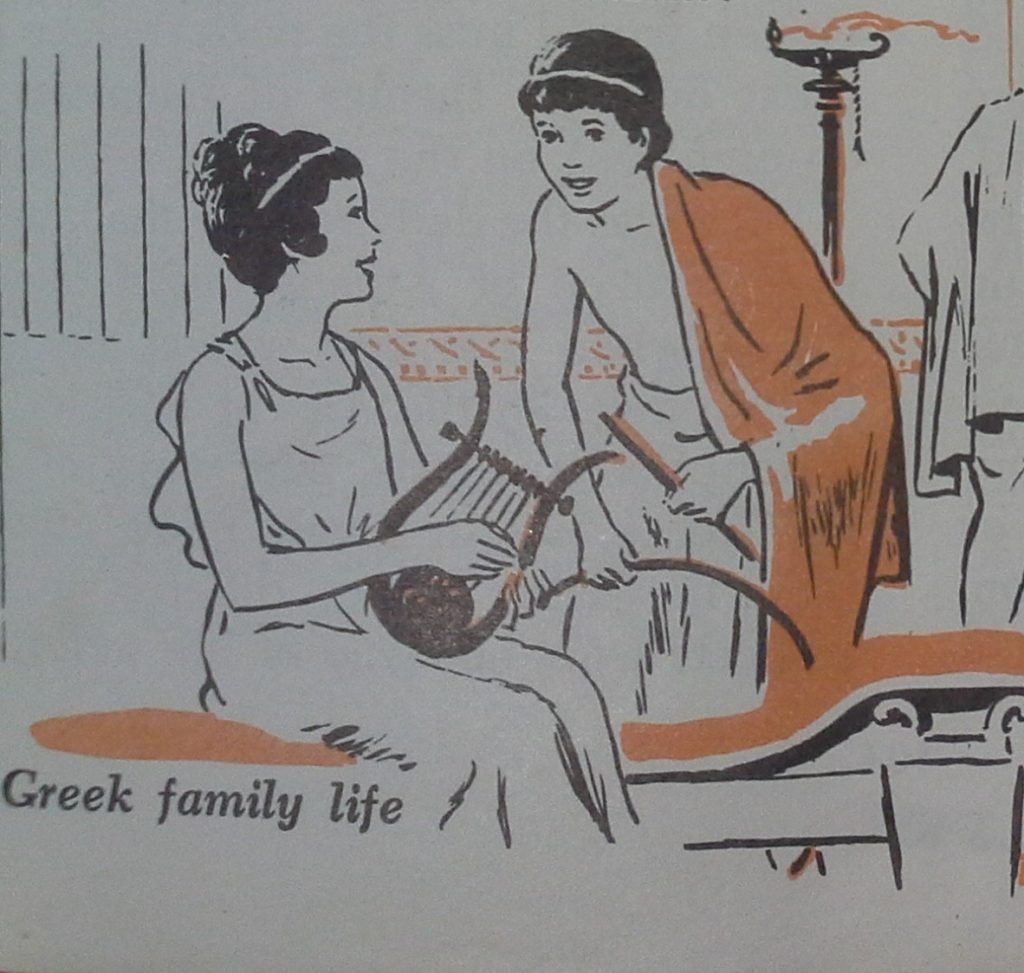
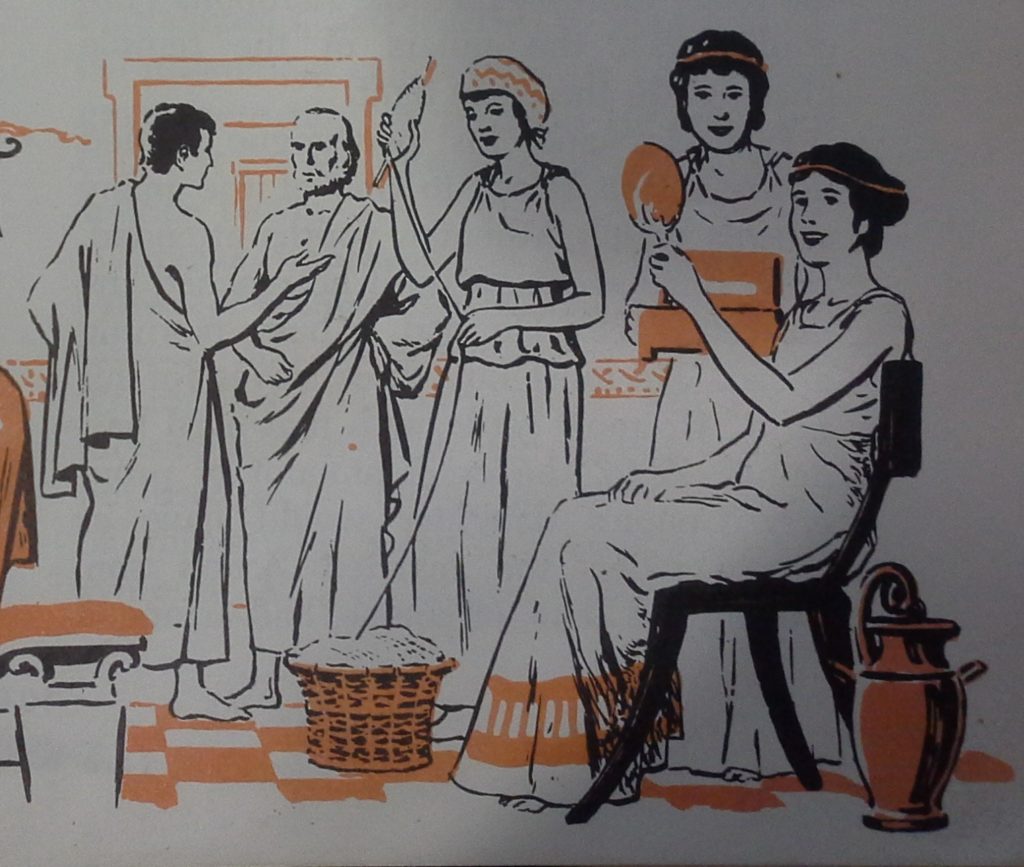
Phoebe, dressed in a longer, belted tunic, went through both courts to the kitchen in the rear of the house and stirred the sleepy slaves to action. One brought Conon his simple breakfast consisting chiefly of bread. The steadily brightening sky told Canon that he should get on down to the Agora, the Athenian market place. The slave whose duty it was to accompany Canon wherever he went awaited him. The porter, an old and wrinkled slave taken in battle years before, swung open the brightly painted street door.
Outside, young Patroklos waited with his pedagogue. Patroklos was Conon’s oldest son and the pedagogue was the slave who went everywhere with the boy. Down the narrow, unpaved street, littered with piles of rubbish, walked father and son, followed by the two slaves. Sunbeams lighted the coloured doors of the plain white house fronts. In the center of the city, high on the rocky hilltop called the Acropolis, the pillars of the temple glistened in the early light.
Patroklos and his pedagogue turned down a side street to one of the many schools which Athenian youths attended, but Conon went on until he reached the market place. He had a busy morning ahead. He must buy three slaves for his farm. He must settle with that hard bargainer, Zeno, the exact amount of property Conon’s daughter would have as dowry when she married Zeno’s son. Canon and Zeno, of course, had arranged the match; bride and groom would meet only a few times before their wedding and Conon wanted to know if that buyer of pottery from Asia Minor paid his bills promptly. Conon’s banker, at his table in the Agora, might know if the foreigner was reliable. If not, some of the bankers at Piraeus, the bustling port of Athens only four miles away, might give him the desired information. Finally Conan must find time to visit his barber, for a friend had invited Conon and eight other men to his home for dinner and a social evening.
After completing his business, Conon would return home for a light lunch and a nap. The afternoon would be spent at the city athletic field — the gymnasium. There he could wrestle, run, or exercise in other ways. More likely, Conan would watch younger men compete while he chatted with Athenians of his own age. Perhaps they would talk of the new play to be given the next day. No Athenian citizen would miss the performance in the great open air theater of Dionysus on the side of the Acropolis.
Such was the daily routine that any well to do citizen of Athens might have followed when that city was at the height of its power in the Age of Pericles. This description suggests that ways of living in Greece, while much more advanced than in earlier times, differed in many respects from our way of life today.
The Greeks did not give all their time to making money. The Greeks engaged in a variety of occupations. In country districts there were free farmers who tended their own farms or worked side-by-side with their slaves. Within the cities and towns there were doctors, bankers, butchers, bakers, masons and carpenters. Even earlier than the Persians, the Greeks had imitated the Lydians in using coined money. Use of money encouraged trade, particularly in Athens. Merchant ships carried goods to and from Egypt, Phoenicia, Asia Minor and other lands on the Black Sea. Many Greeks, like the imaginary Conon, owned small shops where skilled craftsmen fashioned pottery, armour, weapons, leather goods and shoes. Others owned stone quarries and mines where the labour was done by slaves.
In pursuing these varied occupations, however, most Greeks wanted to make only enough money to give them a comfortable living. They were satisfied with simple food, clothing and shelter. They preferred to give their time and energy to serving their governments and to improving their minds and bodies rather than to building up great personal wealth. Although they admired beautiful objects, they despised extravagance and luxury. “Nothing in excess” was one of their best known proverbs.
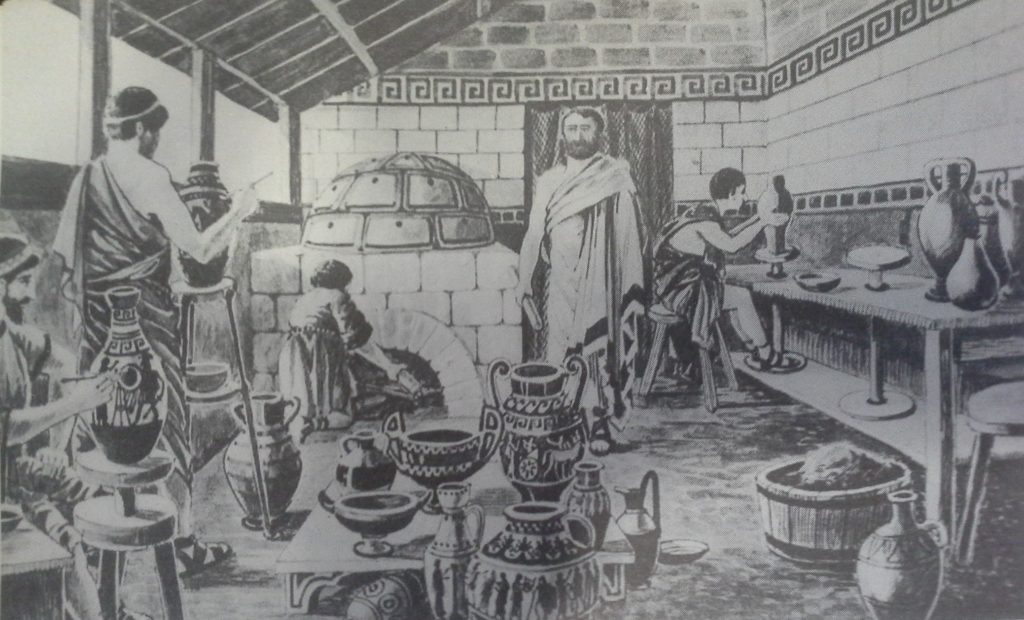
Slavery was an accepted part of Greek life. As you have learned, slaves were used throughout the Greek world to perform various tasks. They were used in mines, on farms, in workshops and even in the household. The Greeks themselves did not object to work in the out of doors, but they disliked monotonous indoor tasks which prevented them from taking part in outdoor public activities.
Family life was important. To the Greeks a family was much more than just parents and children. The Greek family included not only these, but adult unmarried sons, adult married sons together with their wives and children and adult unmarried daughters. A daughter, when she married, left her father’s family and became part of her husband’s father’s family.
The father was always the head of his family. He had legal authority over everybody in it and managed the family property. He chose husbands for his daughters and wives for his sons. When he died, the family property was divided among the sons, each of whom then became the head of a family.
Women in Greece were restricted in their rights and duties. They were not present when their husbands entertained dinner guests, for guests were always men. The mother’s job was to run the household, supervise its slaves and raise the young children. She gave her daughters whatever education they received, for girls had little or no formal schooling.
For most Greek boys education was private. When a Greek boy was about seven, his formal education began. In Sparta, as you know, education consisted almost wholly of military and physical training carried on by the state. Every Spartan boy had to take part in this program aimed at turning out hardy soldiers, but in Athens and most other Greek city states a different system was followed. Children were trained at home upto the age of seven. Then, for the next seven years, boys whose fathers could afford the cost went to school. Here they studied reading, writing, speaking, some mathematics and learned to play a musical instrument called the lyre. Older boys gave more time to physical training, because at the age of eighteen their military service began.

Greeks improved on the Phoenician system of writing. The alphabet which the Greeks used grew out of the Phoenician writing. The Phoenieians had symbols for certain sounds not used in the Greek language. Instead of discarding these apparently useless symbols, the Greeks used them to represent their own sounds for the vowels a, e, i, o and u. They also added symbols for other sounds of their own language. The result was the world’s first alphabet, with symbols for individual letters, both vowels and consonants. Our alphabet and those of western European peoples come from a Latin form of the Greek alphabet. The Russians got theirs more directly from the Greeks.
Greeks put great stress on athletics. Greeks, as you have learned, paid a great deal of attention to physical training and athletics. They believed that exercises and sports not only produced well-developed bodies but aided the growth of skill and character. Greek men and boys spent much time at the gymnasium.
The Greeks were great believers in the value of competition. They therefore held athletic contests at festivals in honour of the gods. There were both city and national contests, the latter open to competitors from all the Greek states. The most famous of these were the Olympic Games held every four years at Olympia. In the popular interest they aroused, the Olympic Games were somewhat like the current World Series. They included not only track and field sports but horse and chariot races. Each winner was awarded a simple prize like a wreath of laurel, but a winner’s home city might vote him a house and a pension. The modern Olympic Games were organized in imitation of the Greek games.
Among the Greeks, religious ceremony overshadowed religious belief. Religion among the Greeks, though important, did not exercise as powerful an influence as in some of the countries about which we have learnt. The Greeks looked upon their gods as a divine family whose father was Zeus and who lived in splendor on the summit of Mount Olympus in northern Greece. The Greeks thought that the members of this divine family, just like humans, had their joys and sorrows, their jealousies and loves.
Each city adopted a god or goddess as its special protector. The goddess Athena, for example, was the guardian of Athens. Temples, statues, processions and festivals honoured the city god or goddess. All citizens were expected to honour the gods and if needed, to take part in public ceremonies. Greeks usually did not force others to accept any definite teachings about these gods and goddesses. People could worship privately as they chose, although they must not interfere with the religious ideas of others. In their tolerant attitude toward the beliefs of others, the Greeks were far ahead of their time.
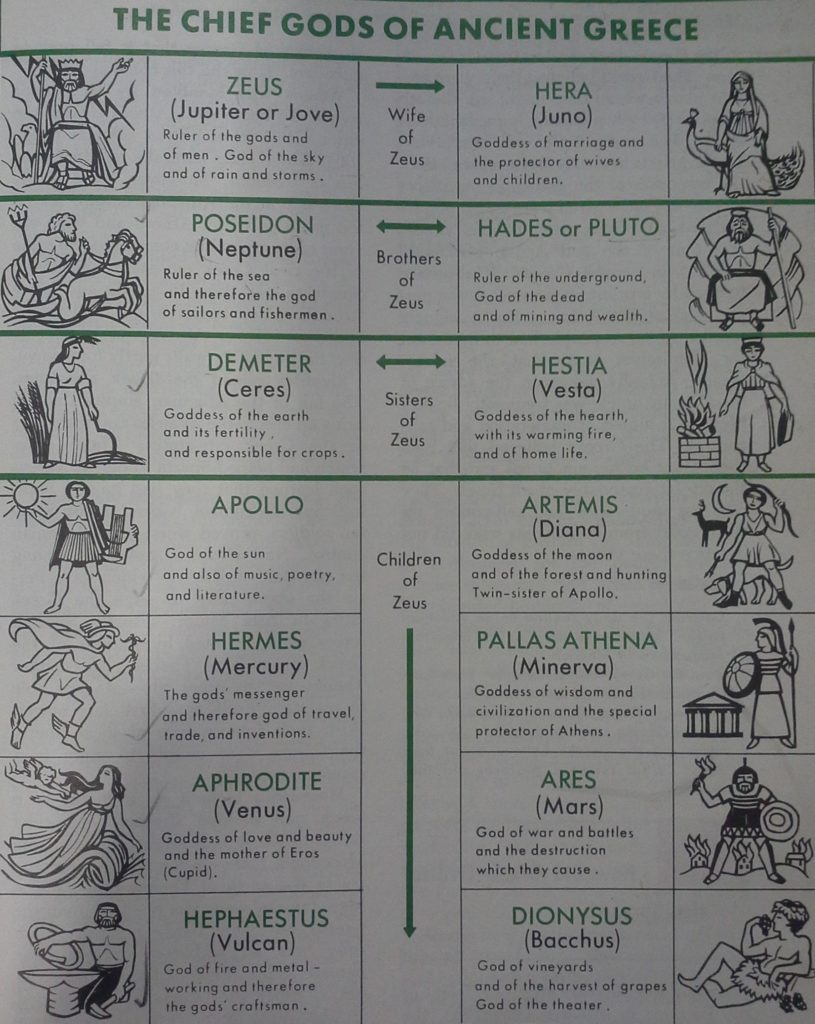
The Greeks depended on oracles for advice. The Greeks believed there were certain places where they might ask the advice of a god when making important decisions. The god’s reply was interpreted by the priests in charge of the place. Both the responses of the gods and the places where they were given were called oracles. The most famous oracle was that of the god Apollo at Delphi in central Greece. The advice handed by a priest or priestess to the person who sought it was given in vaguely worded hints, so people had to figure out for themselves just what the advice meant. Actually, however, the advice of the Delphic oracle was frequently helpful because it hinted at moderation and self-control. The Greeks believed that man should not be too emotional and that he should act reasonably at all times. They felt that moderation and self-control set them apart from non-Greeks who did not practice these virtues.
4. How Did Greek Civilization Spread?
During the 50 years after the defeat of the Persians in 479 B.C., the Greek city-states reached the height of their power and civilization. Of them all, as we learn, Athens was the most flourishing. Then wars between city-states so weakened Greece that it fell prey to outsiders. How did this come about?
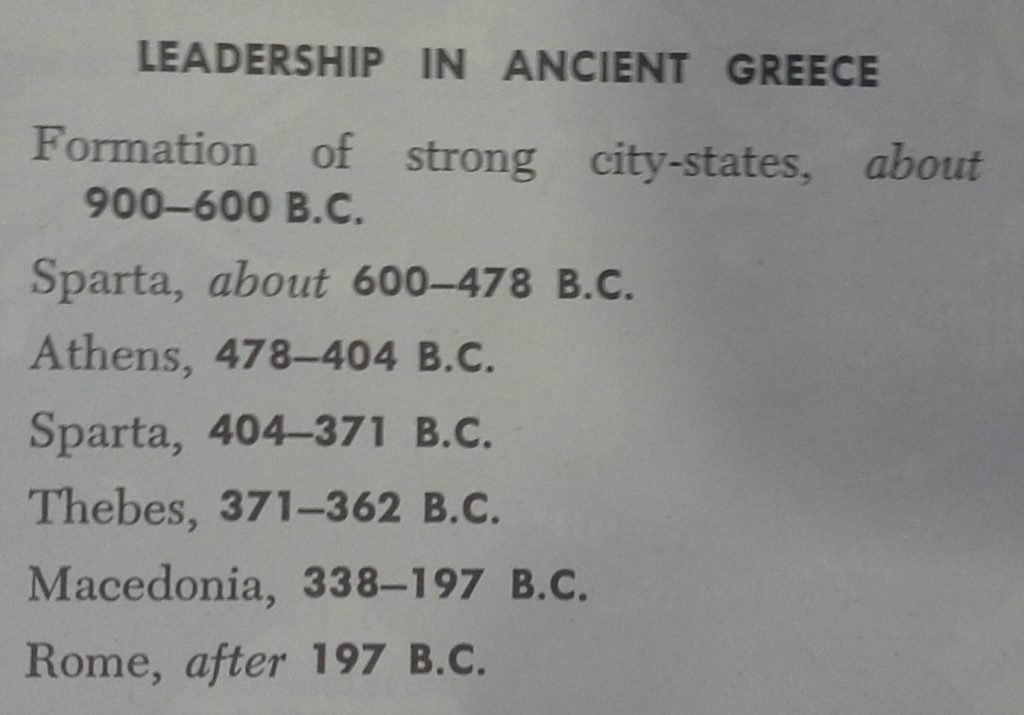
Athens was humbled by its jealous rivals. To begin with, Athens treated the cities within its empire as subjects. These cities naturally resented their loss of freedom. Moreover, some of the cities not in the Athenian empire feared the naval power of Athens and were envious of its expanding commerce. So some of the rival Greek city-states persuaded Sparta to lead them in a long and bitter struggle which began in 431 and finally ended in 404 B.C. Athens was beaten, its fleet destroyed, its walls partly torn down.
Rivalries ruined the Greek city-states. The fall of the Athenian empire did not bring an end to the rivalries and jealousies of the Greek city-states. These cities which had helped Sparta to defeat Athens soon learned that they had gained nothing. Spartan control, backed up by Spartan soldiers, proved worse than Athenian control. New rivalries broke out among the city-states in Greece which gave Persia the opportunity to seize the Greek cities in Asia Minor. Finally Spartan forces were defeated by soldiers of the Greek city-state of Thebes. Neither Thebes nor any other city-state was able to maintain itself as a first class power. With their intense love of local liberty the Greeks were unable to unite in a common cause.
Macedonia loomed us a threat to a weak and divided Greece. The Chief threat to Greek independence came from Macedonia, a country to the north of Greece proper. The Macedonians were less civilized than the Greeks but were hardy fighters. Their ruler was an ambitious warrior king named Philip. Philip admired the civilization which the Greeks had developed, but he was determined to take advantage of the weakness of the small, jealous Greek city-states and thereby increase Macedonia’s power. Philip built up the finest army of the times. It included (1) foot soldiers with long spears and body armour who fought close together in a solid mass, (2) other foot soldiers who spread out widely over the battlefield and threw short spears (javelins) at the enemy and (3) cavalry. This army was equipped with catapults, or machines which threw large stones and with battering rams for smashing city walls.
Demosthenes tried to unite the Greeks. One Athenian statesman, famed for his eloquent speeches, understood and feared the growing might of Macedonia’s king. This statesman, named Demosthenes, pleaded with the Athenians to arm themselves, but his listeners could not believe that Philip would ever seriously threaten them. Demosthenes’ eloquent speeches of warning can be read to this day.
Philip of Macedonia conquered the Greeks. These constant warnings by Demosthenes finally made an impression on the Athenians, but it was too late. Philip and his son Alexander crushed a force of half-trained Athenians and Thebans at the battle of Chaeronea in 338 B.C.
The defeated Greek states were united in a Hellenic (Greek) league by the Macedonians. While the member-states were allowed to control local affairs and to keep their systems of government, they were no longer really independent. They had to agree to keep peace with one another and to furnish soldiers for the Macedonian king in time of war. Refusal to work together had ended Greek freedom.
Philip was succeeded by his more famous son, Alexander. When Philip was murdered shortly after subduing the Greek city-states, his son Alexander came to power. Alexander seemed to do everything better than others. He outran, outrode, outshot and outfought all others. Yet he would also go out of his way to talk with scientists, philosophers, writers of plays, poets and musicians. He was a headstrong military genius who in his 33 years of life flashed like a meteor across a night sky. Unlike the meteor, whose bright trail quickly vanishes, Alexander greatly influenced life in Greece and throughout the Near East. His ambitions drove him to conquer distant lands and wherever Alexander went he introduced Greek ways and ideas. The resulting mixture of Eastern and Western types of civilization set the pattern in art, science, literature and other branches of learning for hundreds of years.
Alexander conquered the Persian Empire. After crushing an attempt by Thebes to throw off Macedonian control, Alexander set out in search of new conquests. He was only twenty two years of age when he crossed into Asia Minor to invade the great Persian Empire. Alexander led an army of 35,000 Macedonians and Greeks, a mere handful compared to the forces of the Persian king, but Alexander’s leadership, skill and enthusiasm out-weighed Persia’s manpower. Moreover, the Persian armies were not well trained or organized.
Alexander’s victories earned him the title of “the Great.” In scarcely twelve years, through a series of brilliant battles, he gained control of all of the Persian Empire from the Mediterranean Sea to the borders of India. You can see the extent of this empire on the map. On into India Alexander swept. Then because his weary troops mutinied, he turned back. In Mesopotamia Alexander laid plans for new conquests, but in vain. Wounds, fever and intemperate eating and drinking weakened him. He died in Babylon in 323 B.C.

Alexander’s empire fell apart. After Alexander the Great died, his empire was broken up by rivalry among his ambitious generals. Three large kingdoms arose. One was Macedonia. Another was Egypt ruled by the Ptolemy family. (Cleopatra, the last of that royal line.) The third empire included most of Asia Minor, along with Syria, Mesopotamia and Persia. There were also other smaller kingdoms and groups of states. All these changes had two important results: (1) The great days of the free and independent city-state in the Greek world were ended. Cities became either parts of larger states or dependent allies. (2) Greek ways of living continued to prevail. The Macedonians, who had learned so much from Greece, encouraged Greek ideas and ways of living wherever they ruled. So there began a period of Greek leadership in the Near East.
Greeks migrated to lands of the Near East. Greeks hurried eastward on the heels of Alexander’s victorious troops. Wars at home had bred hard times, but across the seas there was new opportunity. The new kings paid hired troops well. Kings also desired Greek officials in their new governments. There were attractive opportunities for merchants, bankers, ship captains, lawyers and others. Land was to be had. These Greeks became a wealthy ruling class in the states which grew out of Alexander’s empire.
Important new cities sprang up. Alexander the Great and his successors founded new cities of the Greek type throughout Asia Minor and Syria as well as in Mesopotamia, Persia and Egypt. These cities served as centres from which Greek civilization was spread in all directions. They also supported the authority of the Greek Macedonian rulers over the native populations. These Greek cities became bustling centres of commerce and industry; some in fact ranked among the largest cities of ancient times. Seleucia on the Tigris is said to have had a population of 600,000, Alexandria in Egypt and Antioch in Syria, 500,000 each. A few, like Alexandria, have retained their importance to the present time.
A mingling of Greek with Eastern civilizations took place. The presence of so many Greeks in important positions in these regions made Greek the language of government, law, business and literature among the peoples of the Near East. Over a period of years a mixed population arose, partly Greek and partly native in blood and civilization. The Greeks spread their art and architecture, literature, law and ways of governing and of making war. In turn the Greeks adopted Eastern religious beliefs, ideas of one man rule, business practices and social customs. For example, women in Egypt and Babylonia had the right to own property and to manage their own business affairs. In Greece, on the other hand, women had been under the authority of husbands or other male relatives. S0, odd as it may seem, Greek women who moved eastward acquired more rights than their sisters had back home.
Some Greek cities united to preserve liberty and democracy. Macedonia tried to keep Greece itself under its control and no one of the Greek city-states was strong enough to resist. In order to preserve what liberty they could, some of the cities united to form federal states — that is, they kept a large measure of their local self-government but turned over other powers to the federation or group as a whole. In these federal unions the city states were like the states in the United States, but they had more control of their own affairs.
The federation had a president (called “general”), other federal officers, a federal senate representing the member city-states and a federal army and navy. The chief difference between these and modern federal states is that there was no body of representatives of the people like our House of Representatives. Instead there was a general assembly for all the citizens of all the united city-states. Of course, for all citizens to come together was impossible even in the smallest federal states. The most important of these federal states was the Commonwealth of the Achaeans. Its constitution was studied with care by the framers of the Constitu tion of the United States.
Greece and most of the Greek Near East were finally conquered by Rome. A major weakness of the Greeks, we have discovered, was their inability to co-operate with each other. They could not stay united in the face of common danger. Like the city states before the time of Alexander the Great, the kingdoms and self-governing leagues that came later were themselves out in futile wars. Finally the weaker ones appealed to Rome, a rising young power, for aid. This too was a blunder, for, as we discover, the Romans gradually absorbed both enemies and friends into their empire. Yet even this development had its good side, for Greek ideas spread more rapidly to the Romans than they would have otherwise.
5. What Were the Outstanding Achievements of the Greeks?
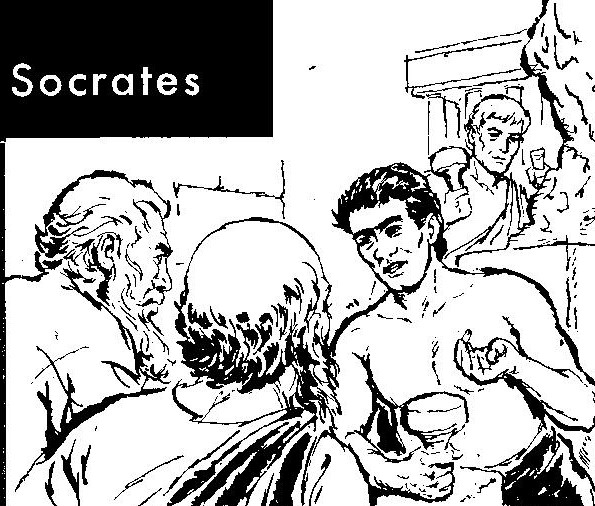
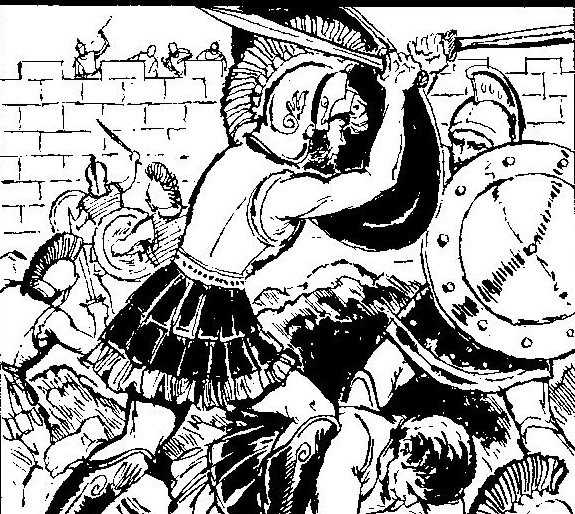
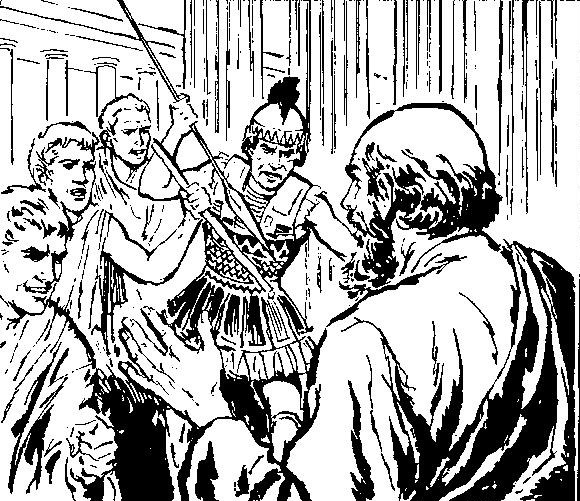
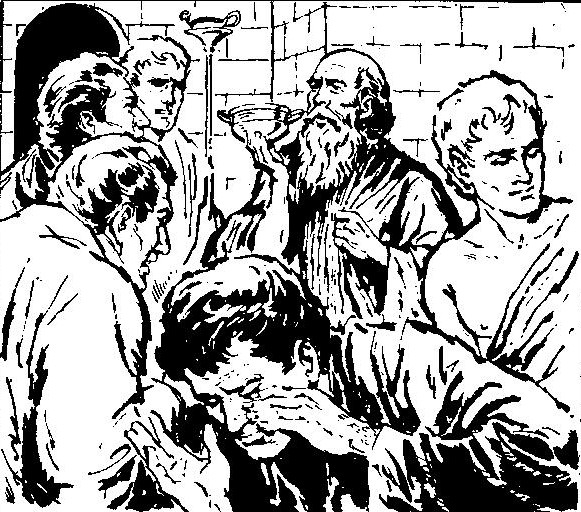
Greek contributions to world progress were important. No people have contributed more to the civilization of Europe and America than did the Greeks. (1) They passed on in improved form much of what they had received from older civilizations. (2) Their own achievements, particularly in govemment, literature, thought and art, have exerted and still exert a tremendous influence upon people. These achievements were the product of Greek speaking peoples not only in Greece itself but in the countries to the east and south that were conquered by Alexander the Great. Most of the writers, artists and other famous men named in this section lived while the power of Greece was at its height. Several of them, however, lived in the first four centuries after Alexander’s time.
The Greeks did not contribute much to increasing man’s control of nature, nor did they produce mechanical inventions which added greatly to man’s wealth or comfort. They did develop new ideas and ideals which are of the highest importance for mankind. They stressed the worth and dignity of the individual person. They also emphasized the need for men to think for themselves. Their search for truth and their habit of reasoning things out led them to strike out along fresh paths of knowledge.
The Greeks greatly advanced government and politics. As you have already learned, love of freedom led most of the city states to develop democratic governments. For us today democracy depends on such practices as free public discussion of questions, the holding of elections, citizens’ taking part in government, majority rule and trial by jury. All these practices the Greeks developed, especially in Athens. After the breakup of Alexander’s empire, Greeks adopted the idea of federal states and federal unions. They not only made their own codes of laws, but were the first to use written constitutions. Most of the cities made provisions for revising or amending these constitutions.
The Greeks did a great deal of thinking and writing on politics, or the science of government. One extremely important question which the Greeks raised was how much freedom an individual may exercise without danger to the state in which he lives. This is a problem which many governments have wrestled with and which is answered very differentIy by the democracies and dictatorships of today.
Great philosophers taught important rules of conduct. The Greeks did not concern themselves merely with government and politics. Among them were brilliant men eager to know about human nature and to understand the universe in which they lived. These men were called philosophers, meaning men who sought knowledge and truth. There was, for example, the homely Athenian named Socrates who devoted his life to teaching his fellow Athenians to become better men and better citizens. By skillful questioning Socrates taught people to discard mistaken ideas and to set up for themselves higher standards of conduct. His enemies argued that he was teaching dangerous ideas, such as disbelief in the Greek gods. They had Socrates tried and put to death because he refused to go back on his teachings or to flee from Athens. To flee, Socrates said, would be to violate the laws, something no good citizen would do even with his life at stake.
Plato, a pupil of Socrates, was one of the greatest of all ancient philosophers. Plato’s reasoning led him to believe that there was one God of the entire universe who was the source of all matter and life. He also taught that man has an immortal spirit which assures him of a life after death. Plato in turn had a pupil, Aristotle, the most learned man of ancient times. His ideas and writings had great influence in his own day and for centuries thereafter.
Some later philosophers were called Stoics because they usually gathered at a pillared porch, or stoa. “How can a man find happiness?” the Stoics asked themselves. They were sure that neither the social standing of one’s family, nor power, nor wealth gave a man real happiness. The road to true happiness, according to them, was to live in harmony with the laws of nature, meaning the laws of God. Stoics therefore endured poverty, suffering and even death with calmness. Stoic philosophy spread throughout the Greek world and remained important long after the birth of Christ. Today we use the word “stoic” to describe a person who does not show his feelings.
The Greeks produced some of the world’s greatest literature. Literature played an important role in the life of the Greeks. Even before they learned to write, the Greeks handed down from one generation to the next long poems which described the adventures of their heroes. Two poems with which minstrels, or travelling entertainers, delighted their audiences were the Iliad and the Odyssey. Said to be the work of a blind poet named Homer, the Iliad and Odyssey deal with heroes and events connected with the ancient city of Troy in Asia Minor. They also furnish a picture of life in the Aegean world 3000 years ago.
Later on, the Greeks produced and enjoyed literature of high quality in different forms. Plays were popular and great tragedies and comedies written by ancient Athenians are often read and some times produced even today. Usually these plays pointed out that the gods controlled the fate of man. To the delight of the audience, however, clever writers of comedies often worked in sly remarks that embarrassed local politicians. These plays were presented in great outdoor theatres with little or no scenery. No man missed a chance to see them; women sometimes were permitted to see the tragedies. Successful playwrights were highly honoured.
The Greeks also took a great interest in public speaking, particularly in Athens. Often the success of a political leader depended on his ability to persuade the public to accept his point of view on a certain policy. You have already learned of two famous Athenian orators, Pericles and Demosthenes. Many splendid speeches of Greek orators have been preserved and can be read today.
The Greeks pioneered in writing history and geography. The Greeks went further than earlier peoples in the writing of history. To them, history was more than a collection of legends or a bare list of events. Its purpose was to inquire into past events so as to learn what really happened and why it happened and above all to present an interesting story. Herodotus, who has been called the “Father of History,” wrote a history of the ancient world which is full of human interest. An Athenian, Thucydides, set a high standard for later historians. He made a careful search for facts, weighed his evidence fairly and wrote in flawless style.
Greeks likewise pioneered in the writing of geography. Strabo about 20 years before the birth of Christ wrote a 17-volume geography of Europe, western Asia and North Africa. This encyclopedia of geography was the best one in existence for more than 1500 years.
The Greeks laid a groundwork for modern science. Since our world today depends so greatly upon science, you will be interested to learn how much we owe to the Greeks. First and foremost they were responsible for developing the scientific spirit. Natural laws rather than chance governed nature, said the Greeks, and they set out to discover and understand these natural laws. They searched for the why and how as well as the what in the world of nature. They had a theory that all matter consisted of a few elements made up of tiny particles called atoms. Their so called elements were not the true elements as we know them today, but many of their basic ideas about elements and atoms were correct.
The Greeks made valuable contributions to various fields of science. Aristotle laid foundations for two of the most important sciences — biology and physics. Greatest of Greek scientists, however, was Archimedes, who lived about 250 B.C. He discovered how to find relative weights of materials by using water as a standard of comparison. You can End “Archimedes’ Law” of spa ciiic gravity in present-day physics text books. He also invented a scheme for raising water to higher levels by means of a constantly revolving shaft shaped like a carpenter’s bit. The idea is used today in mechanical conveyors.
Greeks advanced new ideas in mathematics, astronomy, geography and medicine. Greeks picked up a lot of mathematics and astronomy in Mesopotamia and Egypt. Their interest in the why and how led them to state the basic laws of these sciences. Euclid, for example, a few years after the death of Alexander the Great, set forth the principles of geometry. You will find them in geometry textbooks today. Greeks also developed the branch of mathematics called trigonometry and used it in measuring heights and in astronomy. They figured out the correct explanation for eclipses of the sun. Thales, a Greek who lived in Asia Minor, predicted one which occurred, right on time, in 585 B.C.
One Greek scientist taught that the earth and other planets revolve around the sun. Another, certain that the earth was round, calculated its circumference at the equator and reached a figure amazingly close to the actual circumference of about 25,000 miles. The same man, about 1700 years before the Voyage of Columbus, asserted that it was possible to sail westward from Spain to the coast of India! Many of these advanced ideas were not generally accepted and were lost sight of for hundreds of years.
In addition, Greeks made great progress in medical science. Hippocrates, the “Father of Medicine,” carefully recorded the causes and symptoms of disease. He drew up a code of conduct for doctors. The famous Oath of Hippocrates is taken today by graduates of medical schools. Doctors at Alexandria made considerable progress in their knowledge of the structure of the body and in surgery. They also used drugs to deaden pain during surgical operations.
Greeks achieved perfection in architecture. The Greeks lived in simple but often pleasingly decorated homes. When they built temples, theaters and stadiums, however, they used their money freely and exercised their imaginations. We follow their architectural styles today in many of our public buildings.
Notice the picture of the Acropolis. Dominating this hilltop in Athens are the ruins of the Parthenon. This was the great temple of Athena. The interior of the temple consisted of two rectangular chambers of stone. In the larger chamber was a statue of Athena, a work of the famous sculptor Phidias. The smaller of the two chambers was the treasure room. There was little decoration. The only light came from the open doorway and flickering lamps burning olive oil. Stately columns supported the roof.
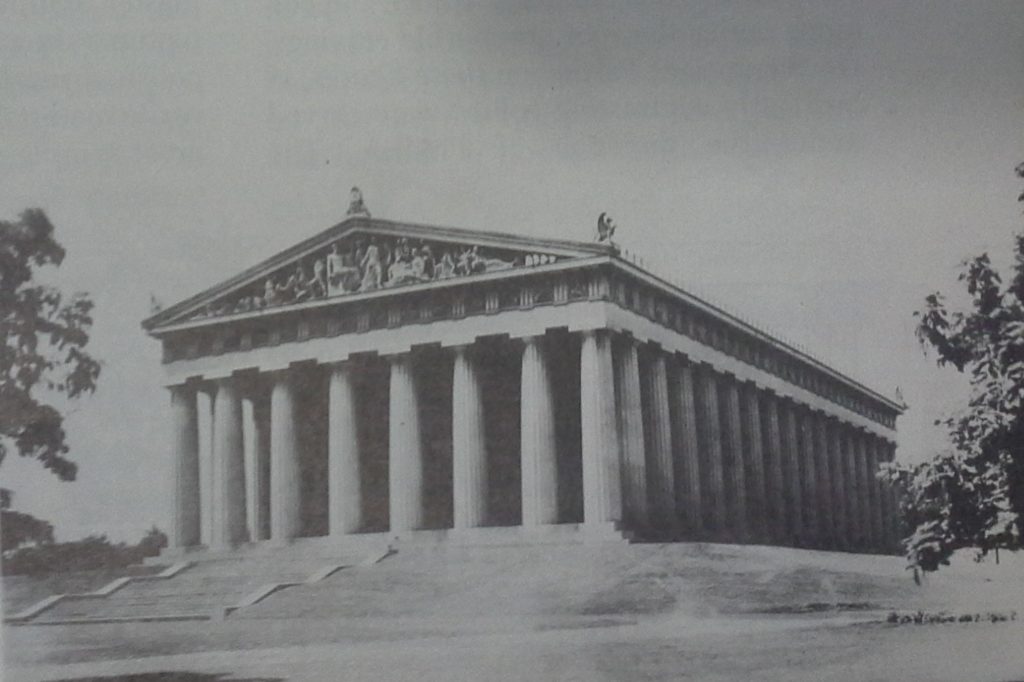
This building is a reproduction of the Parthenon, showing what the outside looked like. Notice the graceful columns surrounding the building. Above the columns under the roof are marble carvings. On the ancient Parthenon these figures, in brilliantly contrasting colours, were carved under the direction of Phidias. The Supreme Court building in Washington D.C., follows the Greek style of architecture as shown in the Parthenon.
You will also want to note the three styles of columns developed by the Greeks; perhaps you can find an example of one or more of these columns in your own community.
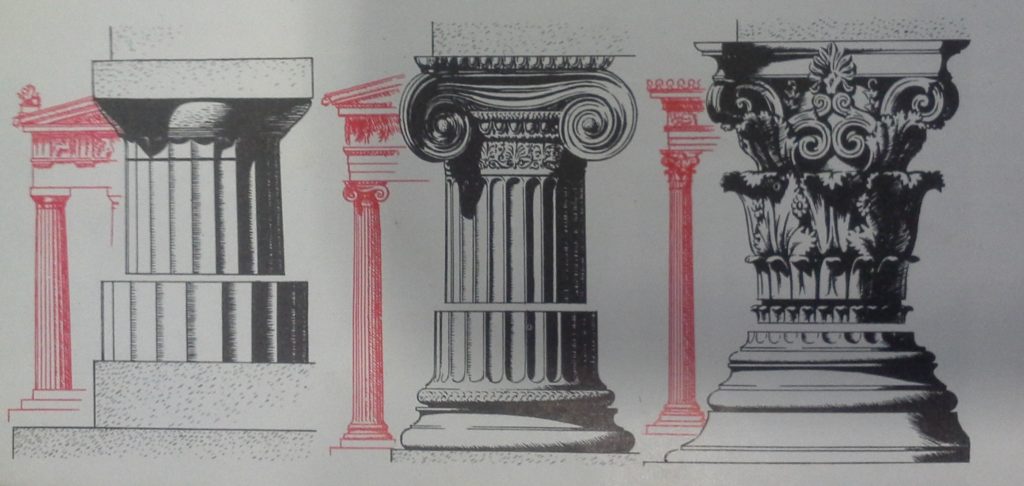
Greek influence is evident in our theatres and stadiums. We are all familiar with theatres and stadiums with curved rows of seats. These have developed from Greek models. Greek theatres were built without roofs, on hillsides, with the seats cut in the natural rock. Below and in front of the seats was the orchestra where the actors or the chorus of singers and dancers performed. For athletic contests the Greeks built large stadiums. These were oblong enclosures with square or curved ends surrounding a straight running track about 600 feet long. In earlier times the spectators watched the games from the hillsides above the track, but later, tiers or rows of seats were provided for the audience.
Greek art reached its height in sculpture. Because of their zest for athletics and their belief that gods and goddesses possessed human forms, the Greeks took great interest in portraying the human body. Their sculptors were the first in the world to attain perfection in representing the human form either at rest or in motion. Highly polished marble and bronze were the favourite materials for Greek statuary, though great temple statues, like that of Athena in the Parthenon, were frequently made up of gold and ivory plates. Unfortunately very few examples of Greek sculpture have survived in their original form, but many are known through excellent copies made in ancient times.
Greek artists and craftsmen produced objects of great beauty. The same beauty and perfection of workmanship were evident in Greek coins, bronze objects and pottery. Although no pictures from the brushes of Greek painters have been preserved on linen or canvas, vase paintings show great mastery of line and colour drawing. Some idea of Greek painting can be obtained also from colorful wall paintings and decorations found in Greece and Italy.
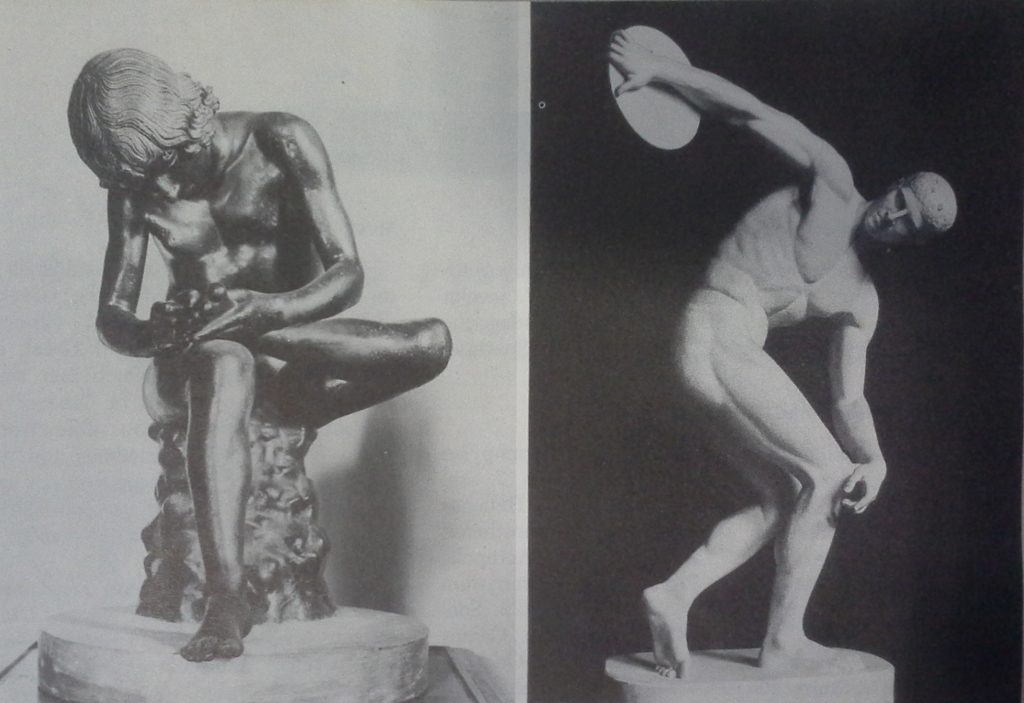
The gift of the Greeks to later ages was a rich one. Inspite of their many and great achievements, the Greeks were far from a race of supermen. Many of their noblest undertakings failed because of bad judgment, greed, jealousy or other weaknesses of character. What is important is that they tried to do so many worth-while things and that they set an example for later generations to follow The Greeks have left us a rich legacy which includes: (1) a wealth of political ideas, institutions and experiences; (2) lofty ideas about man and the purposes of living; (3) the spirit of scientific inquiry as well as scientific progress in many fields; and (4) a great literature and great art that have continued to give pleasure and inspiration throughout the ages.
